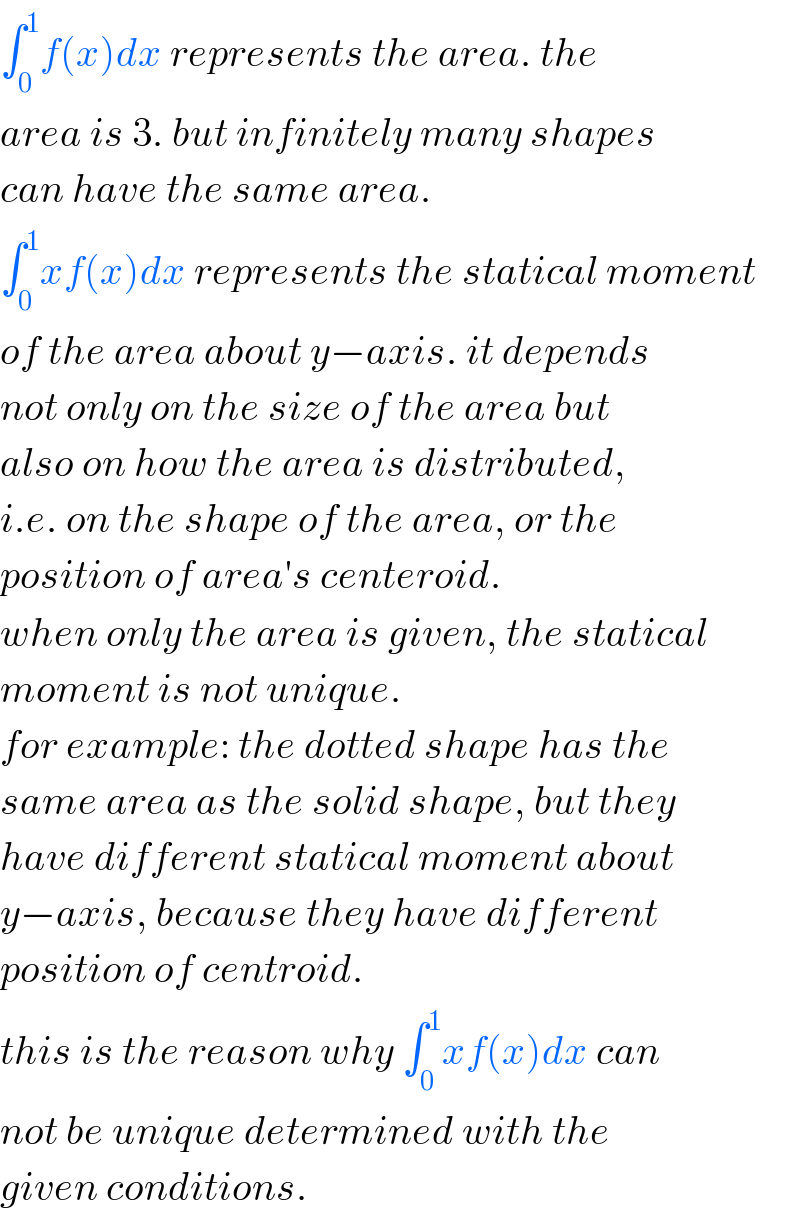
Question and Answers Forum
Question Number 52161 by naka3546 last updated on 03/Jan/19

Commented by prakash jain last updated on 04/Jan/19
![f(x)= { ((7x+1),(0≤x≤1/2)),((7−5x),(1/2≤x≤1)) :} ∫_0 ^1 f(x)dx=∫_0 ^(1/2) f(x)dx+∫_(1 /2) ^1 f(x)dx =[((7x^2 )/2)+x]_0 ^(1/2) +[7x−((5x^2 )/2)]_(1/2) ^1 =((7/8)+(1/2))+(7−(5/2))−((7/2)−(5/8)) =((7+4+56−20−28+5)/8)=((24)/3)=3 f(x) above satifies all conditons. f(0)=1 f(1)=2 ∫_0 ^1 f(x)dx=3 xf(x)>0 for 0<x<1 ∫_0 ^1 xf(x)dx is unlikely to be 0. You can re−check. I will my workinhs again.](Q52176.png)
Commented by mr W last updated on 04/Jan/19

Commented by mr W last updated on 04/Jan/19

Commented by mr W last updated on 04/Jan/19

Commented by Otchere Abdullai last updated on 04/Jan/19

Commented by mr W last updated on 04/Jan/19

Commented by Otchere Abdullai last updated on 04/Jan/19

Answered by pooja24 last updated on 04/Jan/19

Commented by prakash jain last updated on 04/Jan/19
![x∫_0 ^1 f(x)−∫_0 ^1 (dx/dx)∫f(x)dx=(3x)_0 ^1 −∫_0 ^1 3 dx You can not write ∫_0 ^1 [∫f(x)dx]dx as ∫_0 ^1 [∫_0 ^1 f(x)dx]dx You have evaluated internal integral first.](Q52177.png)
Answered by MJS last updated on 04/Jan/19
![if it′s a polynome f(x)=ax^2 +bx+c F(x)=(a/3)x^3 +(b/2)x^2 +cx (1) c=1 (2) a+b+1=2 ⇒ a+b=1 (3) (a/3)+(b/2)+1=3 ⇒ 2a+3b=12 ⇒ b=10, a=−9 f(x)=−9x^2 +10x+1 ∫_0 ^1 xf(x)dx=∫_0 ^1 (−9x^3 +10x^2 +x)dx= =[−(9/4)x^4 +((10)/3)x^3 +(1/2)x^2 ]_0 ^1 =((19)/(12))](Q52180.png)
Commented by tanmay.chaudhury50@gmail.com last updated on 04/Jan/19

